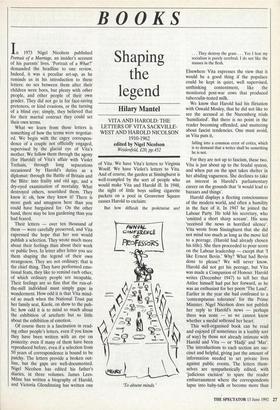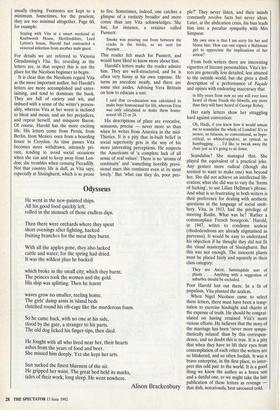BOOKS
Shaping the legend
Hilary Mantel
VITA AND HAROLD: THE LETTERS OF VITA SACKVILLE- WEST AND HAROLD NICOLSON 1910-1962 edited by Nigel Nicolson Weidenfehi, f20, pp.452 In 1973 Nigel Nicolson published Portrait of a Marriage, an insider's account of his parents' lives. 'Portrait of a What?' demanded the headline to one review. Indeed, it was a peculiar set-up, as he reminds us in his introduction to these letters: no sex between them after their children were born, but plenty with other people, and other people of their own gender. They did not go in for face-saving pretences, or kind evasions, or the turning of a blind eye; simply, they believed that for their marital contract they could set their own terms.
What we learn from these letters is something of how the terms were negotiat- ed. We begin with the cagey correspon- dence of a couple not officially engaged, supervised by the glacial eye of Vita's mother. We follow them through the agony (for Harold) of Vita's affair with Violet Trefusis, through long separations occasioned by Harold's duties as a diplomat: through the Battle of Britain and the Blitz: into frailty and old age, and a dry-eyed examination of mortality. What destroyed others, nourished them. They knew it: oh, how they knew it! There is more gush and smugness here than you could have bargained for. On the other hand, there may be less gardening than you had feared.
Their letters — over ten thousand of them — were carefully preserved, and Vita expressed the hope that her son would publish a selection. They wrote much more about their feelings than about their work or public lives. In letter after letter you see them shaping the legend of their own strangeness. They are not ordinary; that is the chief thing. They have performed emo- tional feats, they like to remind each other, of which ordinary people are incapable. Their feelings are so fine that the run-of- the-mill individual must simply gape in wonderment. How odd it is that Vita mind- ed so much when the National Trust put her family seat, Knole, on show to the pub- lic; how odd it is to mind so much about the exhibition of artefacts but so little about the exhibition of emotion.
Of course there is a fascination in read- ing other people's letters, even if you know they have been written with an eye on posterity: even if many of them have been reproduced before, even if a selection from 50 years of correspondence is bound to be patchy. The letters provide a broken out- line, but the gaps are well-documented. Nigel Nicolson has edited his father's diaries, in three volumes. James Lees- Milne has written a biography of Harold, and Victoria Glendinning has written one of Vita. We have Vita's letters to Virginia Woolf. We have Violet's letters to Vita. And of course, the garden at Sissinghurst is well-trampled by the sort of people who would make Vita and Harold ill. In 1948, the sight of little boys sailing cigarette packets on a pool in Grosvenor Square causes Harold to exclaim:
But how difficult the proletariat arel
'To absent minds.'
. . They destroy the grass . . . Yes I fear my socialism is purely cerebral; I do not like the masses in the flesh.
Elsewhere Vita expresses the view that it would be a good thing if the populace could be kept in quiet, well supervised, unthinking contentment, like the monitored post-war cows that produced tuberculin-tested milk.
We know that Harold had his flirtation with Oswald Mosley, that he did not like to see the accused at the Nuremberg trials 'humiliated'. But there is no point in the reader becoming offended, and muttering about fascist tendencies. One must avoid, as Vita puts it,
falling into a common error of critics, which is to demand that a writer shall be something he is not.
For they are not up to fascism, these two. Vita is just about up to the feudal system, and when put on the spot takes shelter in her abiding vagueness. She declines to take an interest in Harold's parliamentary career on the grounds that 'it would lead to bazaars and things'.
Harold displays a fleeting consciousness of the modern world, and often a humility in the face of it. In 1947 he joined the Labour Party. He told his secretary, who 'emitted a short sharp scream'. His sons 'received the news in horrified silence'. Vita wrote from Sissinghurst that she did not mind too much as long as the move led to a peerage. (Harold had already chosen his title). She then proceeded to pour scorn on the Labour leadership — except that 'I like Ernest Bevin.' Why? What had Bevin done to please? We will never know. Harold did not get his peerage, but Vita was made a Companion of Honour. Harold writes (December 1947) to tell her that Attlee himself had put her forward, as he was an enthusiast for her poem 'The Land'. Earlier in the year she had confessed to a 'contemptuous tolerance' for the Prime Minister. Nigel Nicolson does not publish her reply to Harold's news — perhaps there was none — so we cannot know whether a medal softened her heart.
This well-organised book can be read and enjoyed (if sometimes in a loathly sort of way) by those not already intimate with Harold and Vita — or 'Hadji' and 'Mar'. The introductions to each section are suc- cinct and helpful, giving just the amount of information needed to set private lives against public events. The letters them- selves are sympathetically edited, with 'judicious excision' to spare the reader embarrassment where the correspondents lapse into baby-talk or become more than usually cloying. Footnotes are kept to a minimum. Sometimes, for the prurient, they are too minimal altogether. Page 60, for example:
Staying with Vita at a smart weekend at Knebworth House, Hertfordshire, Lord Lytton's house, Harold had contracted a venereal infection from another male guest.
For details we are referred to Victoria Glendinning's Vita. So, revealing as the letters are, in that respect this is not the place for the Nicolson beginner to begin.
It is clear that the Nicolsons regard Vita as the more important author, but Harold's letters are more accomplished and enter- taining, and tend to dominate the book. They are full of variety and wit, and imbued with a sense of the writer's person- ality, whereas Vita at her worst is inclined to bleat and moan, and air her prejudices, and repeat herself, and misquote Bacon. Of course, Harold has the more exciting life. His letters come from Persia, from Berlin, from Mexico: once from a boarding house in Croydon. As time passes Vita becomes more withdrawn, intensely pri- vate, tending to avoid social occasions when she can and to keep away from Lon- don; she trembles when crossing Piccadilly. Not that country life is dull, as Vita says; especially at Sissinghurst, which is so prone to fire. Sometimes, indeed, one catches a glimpse of a rusticity broader and more comic than any Vita acknowledges. She has, for instance, a retainer called Punnett:
Smoke was pouring out from between the cracks in the bricks, so we sent for Punnett...
This reader felt much for Punnett, and would have liked to know more about him.
Harold's letters make the reader admire him. They are well-structured, and he is often very funny at his own expense. He turns an anecdote neatly, and there are some nice asides. Advising Vera Brittain on how to educate a son:
I said that co-education was calculated to make boys homosexual for life, whereas Eton was only calculated to make them homo- sexual till 23 or 24.
His descriptions of place are evocative, sensuous, precise — never more so than when he writes from America in the mid- Thirties. It is a pity that in-built belief in social superiority gets in the way of his more interesting perceptions. He suspects the Americans of 'a complete lack of all sense of real values'. There is no 'aroma of continuity' and 'something horribly provi- sional mars this continent even at its most lovely.' But 'what can they do, poor peo- ple?' They never listen, and their minds constantly revolve facts but never ideas. Later, at the abdication crisis, his bias leads him into a peculiar sympathy with Mrs Simpson:
My own view is that I am sorry for her and blame him. How can one expect a Baltimore girl to appreciate the implications of her action?
From both writers there are interesting vignettes of literary personalities. Vita's let- ters are generally less detailed, less attuned to the outside world, but she gives a droll description of a performance of Facade and opines with endearing inaccuracy that
in fifty years from now no one will ever have heard of those frauds the Sitwells, any more than they will have heard of George Robey.
Her early letters show her struggling hard against convention:
Oh, Hadji, if you knew how it would amuse me to scandalise the whole of London! It's so secure, so fatuous, so conventional, so hypo- critical, so whited-sepulcre, so cynical, so humbugging . . . I'd like to tweak away the chair just as it's going to sit down.
Scandalise? She managed that. She played the equivalent of a practical joke. Any gesture more radical (though she seemed to want to make one) was beyond her. She did not achieve an intellectual lib- eration; what she did was to vary the 'forms of fucking', to use Lilian Hellman's phrase. And what is so frustrating in both writers is their preference for dealing with aesthetic questions in the language of social snob- bery. Vita, in 1913, had the privilege of meeting Rodin. What was he? 'Rather a commonplace French bourgeois.' Harold, in 1947, writes to condemn azaleas (rhododendrons are already stigmatised as parvenus). It would be easy to understand his objection if he thought they did not fit the visual masterplan of Sissinghurst. But this was not enough. The innocent plants must be placed fairly and squarely in their class category:
They are Ascot, Sunningdale sort of plants . . . Anything with a suggestion of suburbia should be excluded.
Poor Harold lost out there. In a fit of populism, Vita planted the azaleas.
When Nigel Nicolson came to select these letters, there must have been a temp- tation to exercise hindsight and charity at the expense of truth. He should be congrat- ulated on having retained Vita's more vicious efforts. He believes that the story of the marriage has been 'never more sympa- thetically related' than by this correspon- dence, and no doubt this is true. It is a pity that when they have to lift their eyes from contemplation of each other the writers are so blinkered, and so often foolish. It was a brave enterprise, in the first place, to inter- pret this odd pair to the world. It is a good thing we know the author as a brave son and a dutiful one, or we might take the late publication of these letters as revenge that dish, notoriously, best savoured cold.



















































 Previous page
Previous page